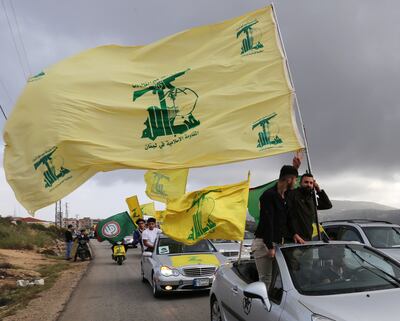As Lebanon prepares for legislative elections, scheduled for March, an increasing number of Lebanese are beginning to doubt whether they will actually happen. The polls will be held in a particularly tricky year for Lebanon, with two major elections – those for Parliament and the presidency – taking place in 2022.
In an interview published on Friday in the pro-Hezbollah newspaper Al Akhbar, President Michel Aoun announced that “at the end of [his] term, [he] would certainly cede his office, in the Baabda Palace, to a president who will succeed [him]." He said: "I will not leave a vacuum.” The phrase was widely interpreted as a threat, implying that if parliamentary blocs failed to reach a consensus on a successor (Parliament elects presidents in Lebanon), Mr Aoun would refuse to leave office.
The link between parliamentary and presidential elections will be very tight. Mr Aoun would like to hand his office off to his son in law, Gebran Bassil, but it is evident that Mr Bassil does not enjoy majority support in Parliament. If he were to perform poorly in parliamentary elections, at the head of the Free Patriotic Movement, his chances would sink even further, all the more so as he is currently under American sanctions.
Mr Bassil’s political rivals, and they are many, would be delighted by such an outcome, which is evidently why they agreed to a March election deadline. Their assumption appears to be that the President and his son in law are likely to lose votes in Christian-majority constituencies because of Lebanon’s dire situation; therefore, it is best to give them a shorter timeframe in which to prepare. Mr Aoun, in turn, has said he would not sign the decree for March elections, and would only do so if elections are held in May.
Beyond the complex calculations of the parties, one thing is near-certain: Hezbollah would prefer to postpone elections, as this would mean that the present Parliament, in which it holds a majority with its allies, elects a new president. While the party may be confident that it will retain Shiite support, as will its ally the Amal Movement, it can’t be sure that Mr Aoun and Mr Bassil, their allies, will hold the line from their end.
In other words, holding legislative elections promises considerable uncertainty for Hezbollah. If it loses its majority, the party would find it difficult to bring in a president of its choice, with the possibility that a compromise candidate would have to be found.

There are several problems, however, in delaying elections. First, a two-thirds majority is required to amend the constitution in that direction, and Mr Aoun would have to sign off on the decision. Extending Parliament’s term would be controversial amid domestic anger and international pressure to hold the vote on time. Moreover, Mr Aoun has said that elections should not be delayed, suggesting he may refuse to sign an extension.
This may be a form of pressure on his part to impose one of two alternatives. Either elections go ahead on time, an outcome that Hezbollah would not welcome. Or, if no elections are held and Parliament’s mandate cannot be extended, there would be no functioning legislature to elect Mr Aoun’s successor, leaving the incumbent in office. This would create a void in the state, but Mr Aoun and Mr Bassil may be calculating that any solution to the problem would require a package deal that brings Mr Bassil to power.
Whichever way one looks at the issue, the ambitions of Mr Aoun and Mr Bassil are creating underlying tensions with Hezbollah and Amal. While it is highly unlikely that Mr Bassil would break with Hezbollah, he seems willing to play on the party’s political liabilities to secure his position as the successor to his father in law.
Hezbollah will also face another problem. If it decides to back a candidate other than Mr Bassil, it will have to pick an alternative who can benefit from Christian legitimacy, or see its ties to the Christians wilt. If Hezbollah were to choose Suleiman Franjieh, a close ally who also has support from the Syrian regime, there is little doubt that both Mr Bassil and the Lebanese Forces leader Samir Geagea would strongly oppose him.
In that case, the parties might have to search for a compromise candidate. The only person who currently stands out is the army commander, Joseph Aoun. Hezbollah would not welcome him, however, because it views the general as being close to the Americans, and it was the army that took the lead in neutralising Hezbollah and Amal when they entered Christian areas with their weapons on October 14.
According to media reports, Michel Aoun recently brought together Joseph Aoun and Mr Bassil, supposedly to improve their relationship. While this could possibly be to prepare for the compromise candidacy of the army commander, it is far more probable that the President was sending a stark message to Hezbollah: if you don’t back Mr Bassil, then expect us to support Joseph Aoun.
At a time of deepening economic crisis, Lebanon appears to be entering an even darker period of discord. The country’s political rivalries will surely mean more debilitating stalemate amid widening national poverty.


